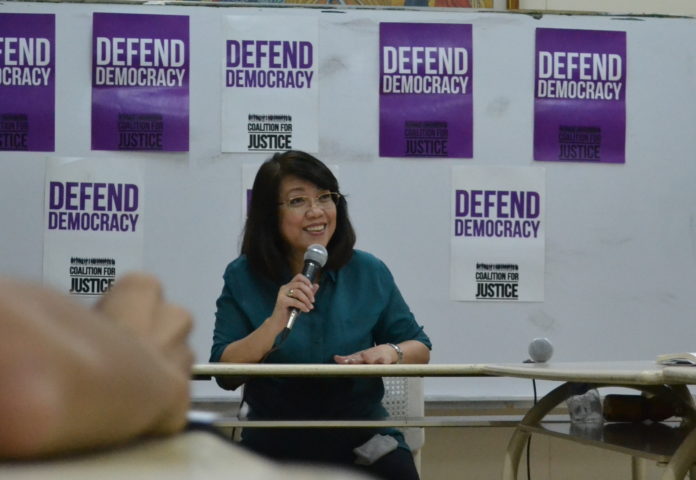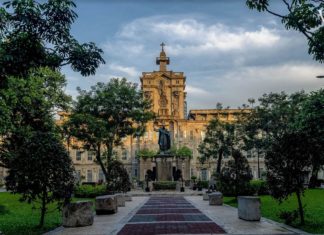
THOMASIANS criticized the Supreme Court quo warranto proceedings that ousted Chief Justice Maria Lourdes Sereno for her supposed failure to file her statements of assets, liabilities and net worth (SALN) when she applied for her post.
Voting 8-6, the Supreme Court granted on May 11 the quo warranto petition to oust Sereno filed by Solicitor General Jose Calida. Quo warranto is a legal process used to question a person’s legal right or authority over his or her position in public office.
A consitutional crisis could arise as removing Sereno through impeachment could fail will no longer be possible after her appointment was nullified by the Supreme Court, said a Thomasian judge, who asked not to be named.
“How can you impeach [Sereno] if the quo warranto proceeding decided she should have not been appointed in the first place? […] What is the authority of Senate to investigate her in an impeachment proceeding if she is not qualified to be a chief justice in the first place?” the judge said.
Sen. Joel Villanueva, an economics alumnus, hit the constitutionality of the decision, and called on the House of Representatives to allow the Senate to try the impeachment case.
“Our fundamental law provides a singular route to remove certain public officials, impeachment. I urge the House of Representatives to forward the impeachment article to the Senate,” he said in a statement last May 11.
For Francis Santos, Central Student Council (CSC) president-elect, Sereno’s removal showed the dominance of the Duterte administration among the different branches of government.
“[Duterte] has taken control of legislative by having a supermajority in the Congress and now he has control of the judiciary somehow, because they managed to get Sereno ousted by quo warranto proceedings,” he told the Varsitarian.
Echoing Santos, Nicolo Bongolan, political science senior, said the ouster of Sereno proves that staunch critics do not stand a chance against Duterte.
Those who voted in favor of Sereno’s removal were Associate Justices Teresita de Castro, Noel Tijam, Diosdado Peralta, Lucas Bersamin, Francis Jardeleza, Samuel Martires, Andres Reyes Jr. and Alexander Gesmundo.
Four of them were appointed by President Rodrigo Duterte while three were appointed by President Gloria Macapagal-Arroyo.
Associate Justices Marvic Leonen, Estela Bernabe, Alfredo Benjamin Caguioa, Presbitero Jose Velasco Jr., Mariano del Castillo and Antonio Carpio voted against the ouster.
Sereno was appointed in 2010 by President Benigno Simeon Aquino III. She was expected to retire in 2030.
‘Respect the decision’
Civil Law Dean Nilo Divina said ousting Sereno through quo warranto proceedings was “constitutional.”
“The Supreme Court is the final arbiter on how the law should be interpreted. In the system of government, given that the Supreme Court interprets the law, I think it is correct to say that it is constitutional to oust [Chief Justice Sereno] by way of quo warranto,” he said.
Philippine Constitution Association lawyer Danilo Roledo, a UST alumnus, likewise said the high tribunal has the authority to interpret the country’s laws.”
“There will be no end to debates if the ruling of the Supreme Court is not respected. We cannot know better than them as we are not the Supreme Court,” he said.
Dennis Coronacion, UST political science department chairman, stressed that the petition followed due process. However, impeachment is the proper recourse, he said.
“The primary reason for the inclusion of the impeachment provisions in the 1987 Constitution is to ensure and uphold public accountability. The beauty of the impeachment trial is that it achieves this by allowing public participation in the trial through our legislators,” Coronacion said.
Article 11, Section 2 of the 1987 Constitution states that members of the Supreme Court may be removed from office through impeachment because of treason, bribery, graft, corruption and other high crimes, and betrayal of public trust.
Sereno faced an impeachment complaint filed by lawyer Lorenzo Gadon, which was approved by the House of Representatives’ Committee on Justice last March 8.
Gadon claimed that Sereno failed to disclose her wealth, purchased an expensive sports vehicle and delayed benefits of a retired court workers, among others.
Last May 30, Sereno filed a motion for reconsideration against the court ruling, arguing that six justices should have inhibited from the case because of bias.
Sereno noted that Associate Justices de Castro, Peralta, Bersamin, Jardeleza, Martires, and Tijam had testified against her during the impeachment hearings at the House of Representatives. With reports from Arianne Aine D. Suarez

















